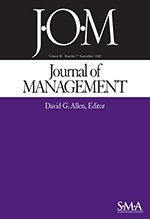
Westbrock, B., Muehlfeld, K. and Weitzel, U. (2019). Selecting Legal Advisors in M&As: Organizational Learning and the Role of Multiplicity of Mental Models Journal of Management, 45(5):2193--2224.
-
Affiliated author
-
Publication year2019
-
JournalJournal of Management
Management scholars have identified a variety of firm characteristics as antecedents to organizational learning. In this study, we conceptualize intraorganizational multiplicity of mental models as a complementary element that facilitates shifting from lower- to higher-level learning. Specifically, we investigate whether multiplicity of mental models—proxied by four measures—helps acquirers to categorically adapt selection rules for legal advisors in mergers and acquisitions (M&As) from domestic toward international settings. In developing our conceptual framework, we integrate resource-based, social network, and organizational learning perspectives. Empirically, we draw on 11,511 acquisition attempts announced from 1998 to 2010 (completion/abandonment assessed as of January 10, 2015, at the latest). The results largely support our theory: First, choosing legal advisors in domestic and international deals calls for different selection rules. While in domestic deals, network-related characteristics are more important drivers of lawyers{\textquoteright} performance relative to their country-specific expertise, the comparative relevance of these attributes is reversed in cross-border deals. Yet, initially, acquirers fail to recognize this. Also, they do not initially adjust their selection criteria appropriately in response to accumulating M&A experience of their own. Only after having attempted a substantial number of cross-border M&As, they reach a turning point at which they rebalance their selection criteria such that they reflect the predominant relevance of country expertise in cross-border settings. Finally, recognition of the need to categorically reassess selection criteria in international deals is significantly facilitated by an acquirer{\textquoteright}s multiplicity of mental models.